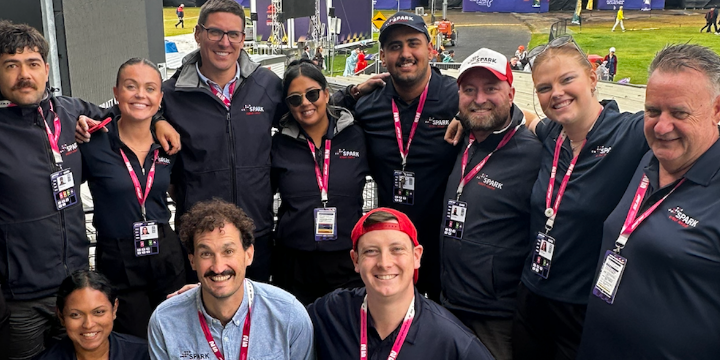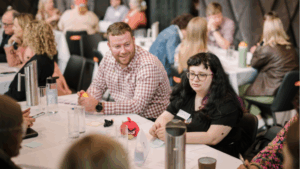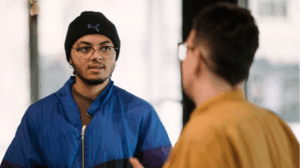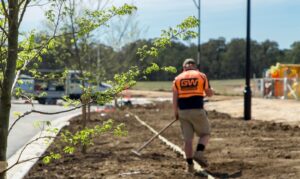*The Employer Innovation Lab helps employers create pathways for young people without degrees, with support from the Paul Ramsay Foundation and the Macquarie Group Foundation. In 2024 SVA ran its first Lab that focussed on young people with disability. The project was majority funded by the Australian Government through the Local Jobs Program and delivered in partnership with Children and Young People with Disability Australia (CYDA).
Spark Event Group was created in 2019 to deliver end-to-end event solutions—from planning and operations to staffing and on-the-ground coordination. With major clients including the Grand Prix and Australian Open, their workforce is dynamic, highly casualised, and often scaled up at speed. When Spark joined the Young People with Disability Employer Innovation Lab in early 2023, they acknowledged a challenge: their recruitment systems were unintentionally excluding young people with disability.
Limited disclosure, inflexible roles, and a lack of experience in designing adjustments meant the team often didn’t know what support new recruits needed, or how to offer it. By the end of the pilot, Spark had rebuilt key parts of their recruitment and onboarding approach, introduced targeted changes to event roles, and created an environment where disclosure felt safe and support could be delivered in real-time.
Job recruitment and design with young people in mind
After attending the Lab’s two-day strategy workshop, Spark made immediate changes. Job ads were rewritten with inclusive language and included a clear message inviting applicants to share their access needs. Candidates could opt for alternatives to group assessments, and the focus of interviews shifted to potential, rather than past experience.
The results were quick to follow: more young people with disability disclosed their needs, allowing team leaders to plan ahead, and applicants felt more confident stepping into the role.
With support from the Lab coaching team, Spark introduced new roles, such as roaming customer service and event runners, designed around individual strengths. They also made adjustments based on needs, allowing, for example, uniform modifications or offering seating during shifts where needed. Even in large-scale events where supervisors were client-appointed, Spark used toolbox meetings to ensure accessibility and flexibility were embedded from the start.
Alongside job design, Spark invited the CYDA team to deliver their disability awareness training across the business, including leadership, permanent staff, and casual teams. Ongoing coaching supported managers to ask the right questions, lead early conversations and create more open, responsive workplaces.
Building the right partnerships
Working with SVA and CYDA, the company connected with local disability employment providers APM and WISE. Spark collaborated with these providers to co-design flexible interview processes, offering in-person, video, or site-based options that best suited the candidate. This created a safer space to explore whether a role was the right fit and made disclosure easier.
Crucially, regular calls with the Lab coaches helped the team stay on track and troubleshoot issues when they emerged. These conversations became safe, non-judgmental spaces to reflect and grow. As part of the Lab, Spark also gained access to practical tools—templates for onboarding conversations, examples of common adjustments, and tips for mentoring young staff with disability. These resources helped normalise inclusive conversations and reduced the pressure on supervisors to “get it right” on their own.
[The Lab] never felt like we were judged if we weren’t achieving as quickly as we wanted to. It just felt like we had support, empathy, and kindness”Rachel Leach • Workforce Director – Strategy & Planning, Spark Event Group
What changed – and what’s next
After the changes to the recruitment process, eight young people with disability joined the team as casual staff. Managers and supervisors reported greater confidence in providing real-time support, including simple yet effective adjustments.
More staff felt comfortable disclosing disability, and open conversations about access needs became a normal part of onboarding.
“We probably were interviewing, connecting and employing more people with a disability than we had realised,” says the team, “and just giving them the opportunity to disclose allowed us to better support them and further their journey.”
The team began tracking disclosure and support needs more consistently, embedding good practice into internal systems and reporting. They also committed to rolling out disability awareness training across their entire workforce.
- Inclusive recruitment messaging led to immediate increases in disclosure
- Eight young people with disability joined Spark in casual roles
- Adjustments like seating, uniform changes, and clearer briefings are now common practice
- Supervisors are more confident in having early conversations and offering real-time support
- Ongoing disability awareness training is being integrated into staff induction
- Internal systems are being developed to track disclosure and adjustments from application to deployment
Their view on what inclusion looks has evolved – moving towards building clearer pathways to secure employment. While casual work is a big part of operations, they also prioritise roles that offer structure, continuity and long-term potential. This shift will gradually help create more stable and inclusive employment opportunities for young people with disability and contribute to addressing very high underemployment rates across this group.
As the business grows, Spark is continuing to build on the learnings from the pilot. Casual roles are now being designed with more structure and support, making them more accessible to a wider range of candidates. Peer support and buddy systems are being tested onsite, and learnings from the pilot are informing their approach across new events and contracts.
Key takeaways for employers
- Words have power: Inclusive language makes a difference. Job ads and sharing access options upfront helped candidates feel welcome and supported.
- Build flexibility: Designing roles around strengths, rather than assumptions or ‘BAU’, unlocks new talent.
- Coach with confidence: Disability awareness training, ongoing coaching and open conversations can be a game-changer that strengthens supervisor capability.
- Partner with providers: While building effective relationships with employment services can take time, it helps employers reach new candidates and can supports smoother onboarding process.
- Provide practical support: Small investments, like covering transport or licensing, remove major barriers.
- Track what matters: Systematically capturing disclosure and support needs helped Spark respond more effectively and build long-term capabilities.
Hear directly from the Spark Event Group team in this webinar, where they share their reflections, lessons and what’s next:
Meet the team
Get in touch to find out how the Employment team can help you create lasting change
-
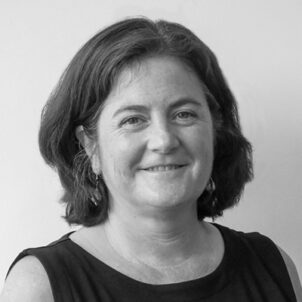 Director, Employment Lisa Fowkes
Director, Employment Lisa Fowkes -
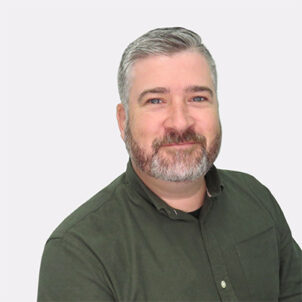 Associate Director, Employment Simon Crabb
Associate Director, Employment Simon Crabb -
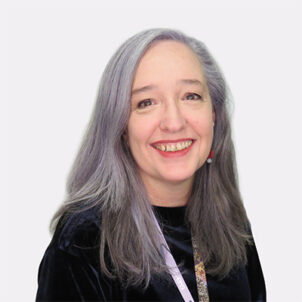 Associate Director, Employment Johann Tabit
Associate Director, Employment Johann Tabit -
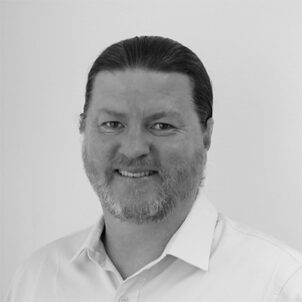 Associate Director, Employment Ronan Smyth
Associate Director, Employment Ronan Smyth -
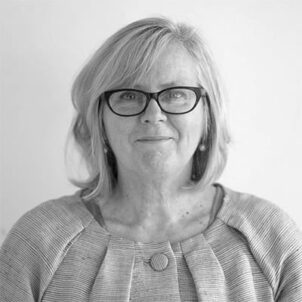 Employer Engagement Lead, Employment Susan Whillas
Employer Engagement Lead, Employment Susan Whillas -
 Employment Evidence and Practice Advisor Christine Han
Employment Evidence and Practice Advisor Christine Han

